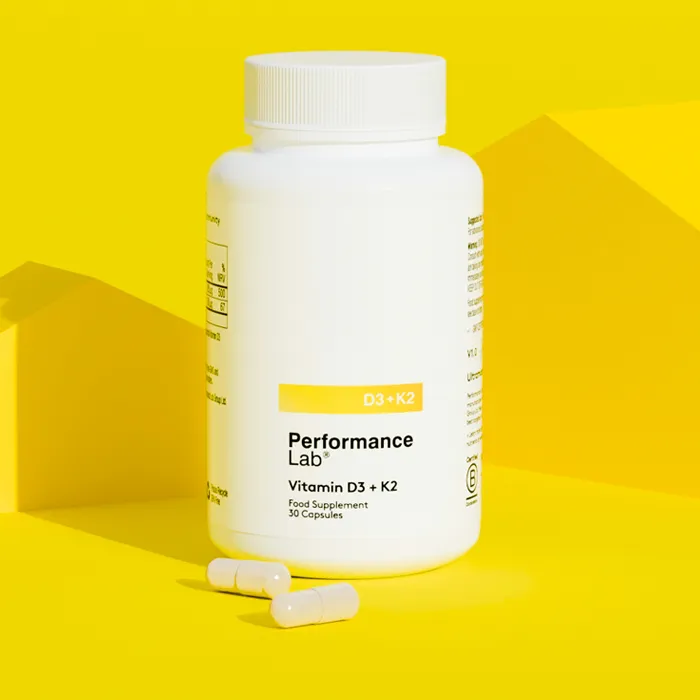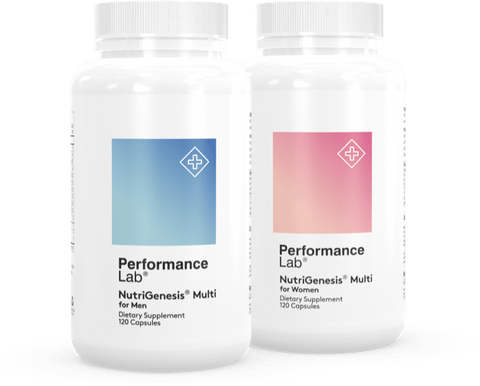You already know that eating healthy is a top priority if you want to perform optimally. You ensure each meal is balanced with lean proteins, healthy fat, complex carbs, and lots of fruit and vegetables. It’s the perfect recipe for performance success.
But even if your diet is on point, you still may fall short in two essential nutrients: vitamin B12 and vitamin D. They’re required for everything from immune function and bone health to brain and skin health.
We’re diving into everything you need to know about vitamin D and B12 and giving you the reasons you should supplement these nutrients together.
Key Takeaways
- D3 and B12 can be taken together; no known antagonism.
- D3 supports bones, immunity, mood; B12 supports red blood cells, nerves, cognition.
- Consider D3 with K2 for proper calcium handling; monitor B12 if you’re vegan or on metformin.
- Consistent dosing and quality forms help maintain healthy levels.

What Is Vitamin D and What Does It Do?
If there’s one vitamin that takes the crown for being multi-purpose, it’s vitamin D. Also known as the sunshine vitamin, vitamin D is arguably one of the most essential of the bunch. It’s one of four fat-soluble vitamins that, unlike other nutrients, the body can produce.
Vitamin D3 is synthesized by the skin from cholesterol upon exposure to UVB rays. It’s transformed into previtamin D3 and then undergoes conversion in the liver and kidneys until it reaches the active form, 1, 25-dihydroxyvitamin D3, otherwise known as calcitriol or vitamin D3 for short. (1)
Vitamin D receptors are expressed in nearly every cell type, and once bound, vitamin D3 can cross the blood-brain barrier, eliciting effects within the brain.
However, the functions are largely unknown. (1, 2) It’s involved in numerous other functions, including:
- Bone health
- Cardiovascular health
- Cell regulation, differentiation, and growth
- Adaptive and innate immunity
- Inflammatory markers
Aside from being one of the most common nutrient deficiencies—it’s estimated that over 50% of the entire population is deficient (1)—there are also several clinical benefits for soaking up the sun (i.e. consuming enough vitamin D):
- Cancer
- Heart disease
- Hypertension
- Obesity
- Type II diabetes
- Depression
- Cognitive impairment
- Parkinson’s
- Osteoporosis
- Autoimmunity
- Infections
If it isn’t apparent, getting enough vitamin D is about more than just boosting your immune system or strengthening your bones. We’ll talk more about the benefits shortly.
The Basics of B12 and Why We Need It
Conversely, we have a water-soluble vitamin that goes by cobalamin, or vitamin B12. It’s often found combined with its cousins in a B12 complex, but B12 has a lot to offer on its own.
Although it’s not required in substantial amounts, vitamin B12 plays several big roles (3):
- Energy production
- Red blood cell formation (hematopoiesis)
- DNA synthesis
- Brain development
- Nervous system function
- Fatty acid synthesis
- Myelin formation
- Cardiovascular health
But the thing with vitamin B12 is that although a deficiency takes a significant amount of time to develop, certain groups are more susceptible to a deficiency than others. Unlike other nutrients, B12 requires the presence of a protein called intrinsic factor (IF) to be absorbed.
IF is produced by cells in the stomach and binds to B12 to form a complex, thereby allowing it to be absorbed in the intestines. (4)
So, for anyone dealing with GI disorders that impair absorption, low stomach acid (age), or inadequate intake, or for vegans and vegetarians, getting enough vitamin B12 can be challenging.
The Benefits of Taking Vitamin D and B12 Together
Brain Health
If you want to keep your memory sharp, you need to be taking B12 and D3. Vitamin B12 is important for protecting your brain against neuronal loss, and low levels have been implicated in memory loss, brain atrophy, and dementia.
In terms of healthy cognitive function, B12 works in conjunction with folate (B9) in the “folate” and “methionine” cycles. (5)
A B12 deficiency results in a functional folate deficiency, as folate can’t be converted to methyltetrahydrofolate.
A folate deficiency, in turn, impairs reactions in the brain that result in decreased DNA stability and repair and gene expression/transcription. The result is a long list of impaired brain functions and an increased risk of brain disorders.
On top of that, proper function of the folate cycle is also required for synthesizing and regenerating a cofactor needed for the production of neurotransmitters (serotonin, melatonin, dopamine, noradrenaline, adrenaline) and nitric oxide.
Besides vitamin B12, vitamin D is also required for proper brain function. Vitamin D receptors are widespread in brain tissue, and its active form (1,25(OH)(2)D3) offers neuroprotective effects. (6) Studies have also linked vitamin D deficiency to Alzheimer’s, cognitive impairment, and dementia. (7)
Low levels of vitamin D and B12 are associated with mood disorders such as depression and anxiety, and vitamin D deficiency is linked to an increased risk of these mood disorders. (12, 13) Additionally, those with brain fog or chronic fatigue may show overlapping signs of both vitamin D and B12 deficiencies. (14)
Bone Strength and Integrity
Although calcium, magnesium, and phosphorus are all required for bone health, they can’t do their job without vitamin D—it acts like an air-traffic controller to help regulate levels of these nutrients. Vitamin D plays an important role in regulating calcium uptake from the gut.
It supports the mineralization of the collagen matrix in bone to maintain strength and integrity. When levels of vitamin D decline, calcium is pulled from bone to maintain serum levels, leading to weakened bone structure and an increased risk of fractures. (8)
And of the B vitamins, B2, B6, and B12 play critical roles in maintaining bone health.
Several lines of evidence suggest an association between B2, B6, folate, or B12 and a lower risk of osteoporosis or hip fracture, but B12 may also be involved due to its role in homocysteine metabolism (9); high levels of homocysteine have been shown to increase fracture risk, but concrete evidence is lacking.
Other studies suggest that a deficiency of B vitamins, including B12, increases the resorption activity of osteoclasts.
Energy Levels
Fatigue is one of the primary symptoms of B12 deficiency because of its involvement in red blood cell production and tissue oxygenation.
Low levels of B12 impair DNA synthesis, which interferes with the activation of folate and, as a result, reduces the production of normal red blood cells and subsequently impairs oxygen delivery. (10)
When tissues aren’t sufficiently oxygenated, energy levels drop, and fatigue sets in. But your body also requires other nutrients for energy metabolism.
Although the exact role of vitamin D in energy production isn’t clear, studies show that the VDR is located in cells of the pancreas, adipose tissue, liver, and cells of skeletal muscle—all organs that play a key role in energy metabolism and nutritional energy balance. (11)
Where to Find Them
Don’t want the hassle of making sure you’re getting enough through diet? Make things simple with Performance Lab NutriGenesis Multi—an innovative multivitamin designed to fill nutrient gaps without going overboard. Experience the benefits of taking vitamin D and B12 together, along with other key vitamins and nutrients.

In each serving, you’ll find 100% DV of 17+ essential vitamins and minerals complexed with cofactors to boost absorption and bioactivities.
References
- Nair R, Maseeh Vitamin D: The “sunshine” vitamin.J Pharmacol Pharmacother. 2012;3(2):118-126.
- Medeiros JFP, de Oliveira Borges MV, Soares AA, et al. The impact of vitamin D supplementation on VDR gene expression and body composition in monozygotic twins: randomized controlled trial. Sci Rep. 2020;10(1):11943.
- Ankar, A, Kumar, A. Vitamin B12 Deficiency. (Updated 2021 Jun 7). In: StatPearls (Internet). Treasure Island (FL): StatPearls Publishing; 2022 Jan-. Available from: https://www.ncbi.nlm.nih.gov/books/NBK441923/
- Oh R, Brown DL. Vitamin B12 deficiency. Am Fam Physician. 2003;67(5):979-986.
- Kennedy DO. B Vitamins and the Brain: Mechanisms, Dose and Efficacy—A Review. Nutrients. 2016;8(2):68.
- Anjum I, Jaffery SS, Fayyaz M, Samoo Z, Anjum S. The Role of Vitamin D in Brain Health: A Mini Literature Review. Cureus. 2018;10(7):e2960.
- Boucher BJ. The problems of vitamin d insufficiency in older people. Aging Dis. 2012;3(4):313-329.
- Laird E, Ward M, McSorley E, Strain JJ, Wallace J. Vitamin D and bone health: potential mechanisms. Nutrients. 2010;2(7):693-724.
- Dai Z, Koh WP. B-vitamins and bone health--a review of the current evidence. Nutrients. 2015;7(5):3322-3346.
- Tardy AL, Pouteau E, Marquez D, Yilmaz C, Scholey A. Vitamins and Minerals for Energy, Fatigue and Cognition: A Narrative Review of the Biochemical and Clinical Evidence. Nutrients. 2020;12(1):228.
- Fraser DR. Vitamin D deficiency and energy metabolism. Endocrinology. 2015;156(6):1933-1935.
- Akpınar Ş, Karadağ MG. Is Vitamin D Important in Anxiety or Depression? What Is the Truth? Curr Nutr Rep. 2022 Dec;11(4):675-681.
- Tufan AE, Bilici R, Usta G, Erdoğan A. Mood disorder with mixed, psychotic features due to vitamin b12 deficiency in an adolescent: case report. Child Adolesc Psychiatry Ment Health. 2012 Jun 22;6(1):25.
- Munipalli B, Strothers S, Rivera F, Malavet P, Mitri G, Abu Dabrh AM, Dawson NL. Association of Vitamin B12, Vitamin D, and Thyroid-Stimulating Hormone With Fatigue and Neurologic Symptoms in Patients With Fibromyalgia. Mayo Clin Proc Innov Qual Outcomes. 2022 Jul 31;6(4):381-387.












